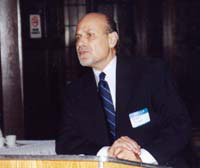TC Forum: 9/11 as the Latest Chapter in Ancient Struggle
In the first Teachers College Forum of the academic year, Barry Rosen, the Executive Director of External Affairs and one the 52 Americans held hostage in Iran from 1979-81, spoke to an audience of tri-state superintendents about September 11 as "the latest chapter in a long struggle between Muslim states and Islamists (fundamentalists) for the hearts and minds of Muslim believers."
The Teachers College Forum, presented twice each semester, provides an opportunity for tri-state superintendents to discuss current educational issues with one another, with members of the Teachers College faculty, and with distinguished guests. Thomas J. Sobol, the Christian A. Johnson Professor of Outstanding Practice and the Director of TC's Superintendents' Work Conference, coordinates the Forum.
Rosen opened his discussion on "Autocracy, Democracy, and the Islamic Idiom" by tying in his own terrorist experience with that of September 11th. He said, "In January 1981, the Islamic Republic of Iran released 52 Americans whom the revolutionary students occupying the Tehran embassy had held for 444 days. This ended a traumatic intrusion of Middle Eastern politics upon the American psyche. Twenty years and eight months later, a similarly unimaginable confrontation between Middle Eastern political reality and American complacency exploded at the World Trade Center and the Pentagon. Two calamitous incidents 20 years apart, both hinging to some degree on currents in Islamic politics."
Rosen cited the irony that a limited war against terrorism requires the full support of many of the current autocratic Muslim regimes in the Middle East, Central Asia, and beyond. "But," he said, "a more serious war obviously goes to the ‘root issue' that is often the despair of policy makers, and in which the need to democratize is high on the list. Moving from a limited war to a broader war entails a shift from a conservative status quo agenda on leadership issues to a liberal and democratic one--quite the antithesis-which is one reason why the Bush Administration will unlikely move in that direction."
"What would be the reaction in the Middle East if the U.S. declared publicly-not today but down the road after bin Laden has been eliminated-that the absence of democracy is perceived as the key source of frustration, tension, hopelessness and radicalization in the Muslim world and that therefore Washington will expect to see measured progress in the region over time in all countries." Rosen added that this change in U.S. policy would be conditioned by the responsiveness of Muslim regimes to this requirement in its bilateral relations. "Surely a regular and major emphasis on this issue-just like our present emphasis on terrorism-could have some significant effect."
Rosen went on to say, "The ultimate problem of course is that we all know that such liberalization and opening will bring political turmoil in its wake-inevitable in any major transition from authoritarianism. That unfortunately is unavoidable as well as certain, but such a transition must come if we are to break out of the present vicious cycle we are in today that produces much of the silent-or not so silent-approval of bin Laden. In my view this is the number one issue in any truly serious war against terrorism, even though the effects can only be long term. However, I detect no willingness anywhere in Washington to bite this hardest of all bullets."
"Catching Osama bin Laden and destroying the Taliban," Rosen said, "will do nothing to alleviate nightmarish conditions in the Afghan countryside or the slums of Cairo. Nor will it keep Pakistani and Saudi youths from being taught that democracy is evil and that an oversimplified form of Islam is a source of unrivaled wisdom."
Rosen believes that a lasting solution to the crisis of terrorism requires an arduous two-pronged strategy of economic development and cultural repair. He said, "Out of both compassion and self-interest, the developed countries must take steps to assist the Islamic world in ways that go beyond window dressing. For starters, the United States and the European Community should lift barriers to the industrial and agricultural exports of the Islamic countries, especially the poorest. Equally important, the developed world must lend a helping hand to the secular education systems of the Middle East and South Asia. Within the Islamic world itself, governments and civil organizations can join the struggle through a dual program of their own. Making a renewed and credible commitment to poverty reduction, they must also be willing to counter the nonsensical and destructive elements of Islamist discourse."
"This," he added, "is needed to insure that the majority of Muslims realize that they have a stake in their government, and in a global political order in which they are treated as valued partners."
Asked by a superintendent what should be taught in light of September 11, Rosen remarked, "Don't go on with the same old curriculum. Get your students engaged in questioning-in an interdisciplinary manner-American foreign policy and its relations with the Muslim world. This is truly engaging them in critical thinking about democracy."
Published Monday, May. 20, 2002
